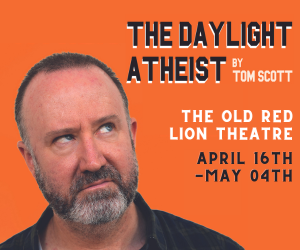‘The Merchant of Venice’ has always been a problematic play, with its Elizabethan anti-Semitism rubbing shoulders with almost fairy-tale elements (the three caskets) and Shakespeare’s emerging dramatic skill infusing the racial stereotype with a kind of grudged humanity almost in spite of the playwright’s conscious intent.
As a script it’s an extraordinary act of reclamation.
Eric Richard’s bare-bones adaptation will have none of the ambiguity. Stripped down to a single 80-minute act, ‘The Trial of the Jew Shylock’ lays bare the insistent, raucous, ugly racism of the play – of its world, and of all its Christian characters – in a version which does away with the business of the caskets, reduces the romantic subplot of Shylock’s daughter Jessica’s elopement with the Christian Lorenzo, till all we have is the racially motivated vendetta of Antonio and Shylock. ‘Jew! Jew! Jew!’ - the play tolls the scornful word in every scene – along with ‘Dog’, ‘Infidel’, and any number of insults which have the audience wincing in their seats. This is a play which does what it says on the packet; just as the slandered Oscar Wilde turned from prosecutor to persecuted in his subsequent trials, so Shylock prosecuting for his debt, his forfeit, his pound of flesh, turns into the victim, on trial himself. At which moment we realise that Shylock has been on trial – and pre-judged – all his life simply for being a Jew. As a script it’s an extraordinary act of reclamation.
Would that the production was its equal. Director Susannah Lane Bragg comes from a predominantly filmic background, and this might account for the extremely low pitch of the performances. Maybe she is aiming for a kind documentary realism, suggesting the everyday nature of racism; maybe it stands in ironic counterpoint to the almost Gothic savagery of the denouement. Either way, moment for moment, it makes for a flat enactment, devoid of nuance and subtext. The two great speeches in the play, Shylock’s “Hath not a Jew eyes?” and Portia’s “The quality of mercy is not strained” are both polemics. They are arguments, aiming to convince antagonists of important universal truths. They need to feel desperately important to the character saying them. Otherwise, as here, nothing seems to be at stake. Joe Shefer’s Antonio, the fall guy for the debt, needs to have the energy of rabid hatred, but also the suppressed emotion of intense homoerotic love for Bassanio. The text preserves this element, in that twice the demands of male love take precedence over marital love, but bodily contact is confined to a manly hug and a pat on the back, and there is no hint of the intensity of feeling between these two. Shefer, elsewhere a good actor, here bears all the signs of an actor who hasn’t been allowed to do what he wanted to do, and has nothing else to offer.
Ashley Gunstock as Shylock and Emma Lyndon-Stanford as Portia are similarly inhibited. Gunstock wears a look of perpetual injury, but it is mostly directed inward rather than outward. The one point where he catches fire is when he turns on his Christian tormentors to say, “The villainy you teach me I will execute. I am what you have made me; I am your reflection." The production lifts momentarily. Ms Lyndon-Stanford, is hampered by seeming somewhat old for the part, and ill at ease with the shape, rhythm and formality of Shakespeare’s early blank verse.
Everyone is hampered by some fiddly, noisy scene changes involving a lot of moving things around on casters. A token modernisation distracts, with suitors being assessed on Facebook, smartphones providing the latest shipping news; the trouble with this is that Antonio’s merchant trading is irredeemably Elizabethan, far flung exotic argosies risking all for huge profits. Bring it into the modern world, and you can’t help asking, ‘Isn’t he insured?’
For all the deficiencies of performance, the play does in the end work. The trial scene is kept virtually intact, which means proportionately it takes up a far larger piece of the action than in a conventional production. By contrast with what has gone before, it is slow, inexorable, builds up terrific tension. Gone are the mobiles, and, as Shylock sharpens his knife on the sole of his boot before claiming his pound of flesh, we move into territory which is timeless. Of course we know that Antonio is not going to die, but the delay before Portia rides to the rescue on the weasel words ‘A pound of flesh – but no blood’ is agonising.
This production ends with a wordless scene showing what is only referred to in the original – Shylock’s forced conversion to Christianity. Dragged before a priest, sobbing, held down while the cross is branded on his forehead, and left broken, staring into space, this is an unforgettable image of barbarism which resonates behind the eyes long after the end; barbarism which taints the whole of Venice, for all its supposed civilisation, and all these supposedly ‘good’ characters who are nothing but arrant hypocrites. After all, as Shylock reminds them, they keep slaves. I was reminded that the fourteenth century, in which the original tale is set, was not long after the time when the ancestors of Bassanio, Antonio and Portia slaughtered women and children in the nave of the Agia Sofia in Byzantium, and, turning cannibal, ate Muslims during the Crusades. “Quality of mercy?” Pull the other one.









